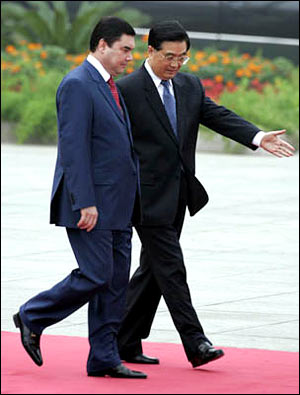| Home / International / International - Photo News | Tools: Save | Print | E-mail | Most Read |
| China, Turkmenistan Sign Energy Deals |
| Adjust font size: |
China and Turkmenistan yesterday signed a series of cooperation agreements on trade, technology, education and energy, including two on sharing natural gas products and gas purchase. According to a joint statement signed by President Hu Jintao and his Turkmenistan counterpart Gurbanguly Berdymukhamedov in Beijing, the two countries agreed to expedite talks on energy partnership to complete the proposed China-Turkmen gas pipeline at the earliest. China's largest oil producer, China National Petroleum Corp (CNPC), and a Turkmen government agency signed the product-sharing contract, and the gas purchase deal was inked between CNPC and a Turkmen natural gas firm. During his meeting with Berdymukhamedov, Hu proposed to enhance political mutual trust, deepen economic and trade relations, increase cultural and personal exchanges and strengthen security partnership. Hu said: "The two sides should fully develop their advantages and expand cooperation in trade, oil, gas, transport and telecommunication." In response, Berdymukhamedov said his country is ready to strike deals on natural gas. Turkmenistan is willing to join China in the fight against terrorism, separatism and extremism, too, he said. It is committed to maintaining peace, stability and development in the region.
The Turkmen president was accorded full military honors, complete with a 21-gun salute after he arrived in Beijing yesterday afternoon on a two-day state visit. This is first visit since he assumed office in December last year after the death of his predecessor Saparmurat Niyazov. When Niyazov visited China in April last year, the two countries signed an agreement, according to which China would buy 30 billion cubic meters of natural gas a year from the resource-rich Central Asian country for 30 years. The gas is to be delivered through a pipeline to be built by 2009. Analysts, however, said some technical problems have to be solved - especially in building of the pipeline - to smoothen the energy cooperation between the two countries, although they already have a partnership agreement. "The biggest problem is in building of the pipeline, which will have to pass through a third country, most probably Kazakhstan and Uzbekistan. So the energy cooperation has to involve other Central Asian countries, too" Sun Zhuangzhi, a Central Asian expert with the Chinese Academy of Social Sciences, said. Turkmenistan has the largest gas deposits among the former Soviet republics after Russia. (China Daily July 18, 2007) |
| Tools: Save | Print | E-mail | Most Read |
 |
| Related Stories |
 |
 |
|
 |
| Links |
